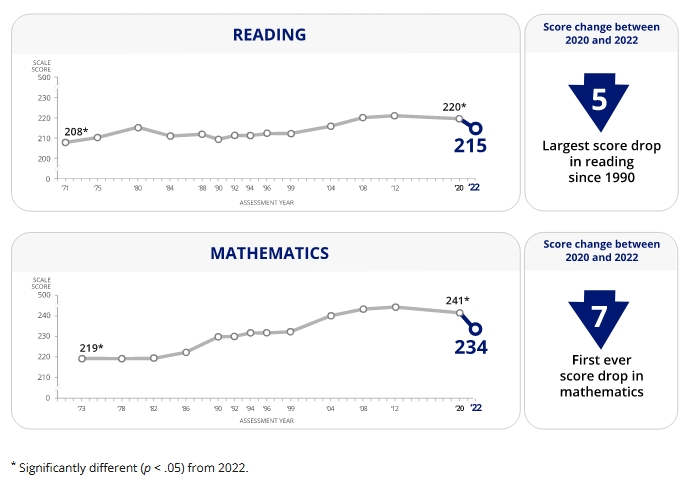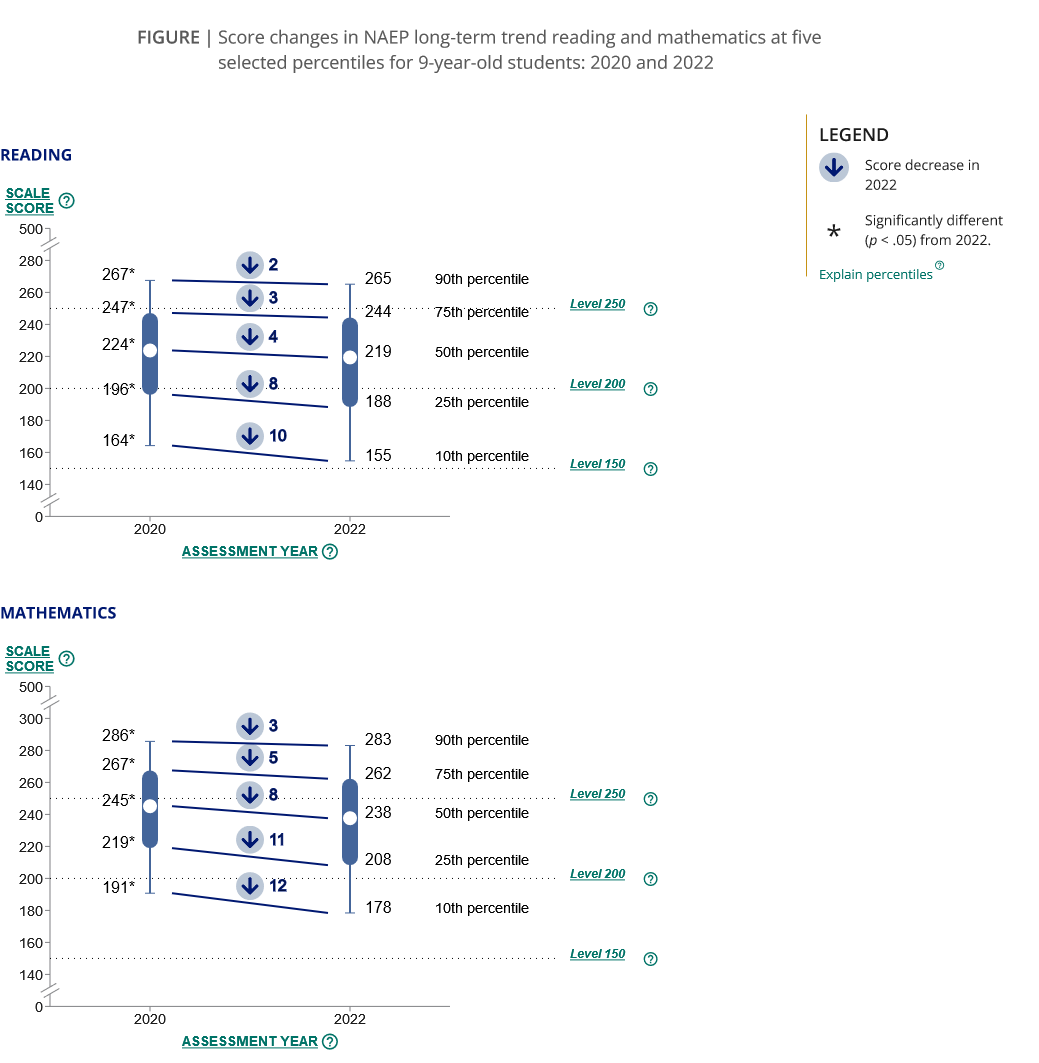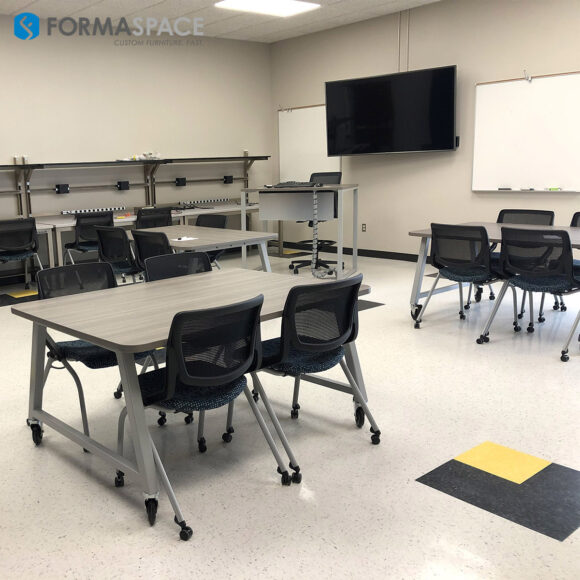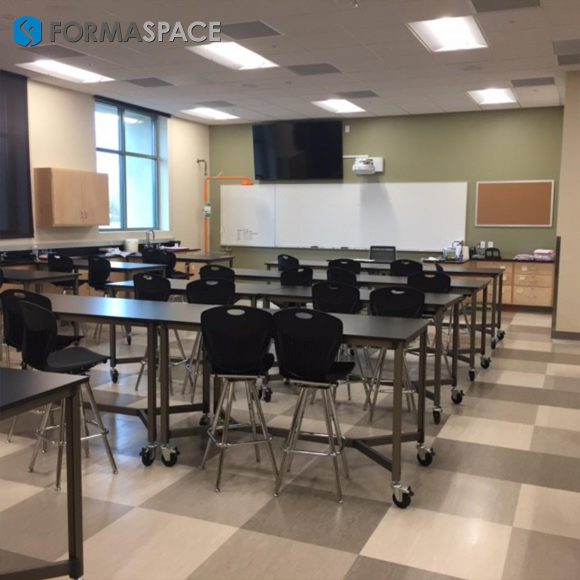Educators Meet in Austin at the 2023 SXSW EDU Conference
In this Formaspace Education report, we look at the Education events that took place at the recent 2023 SXSW EDU conference held in Austin this past March.
A hot topic at the conference was how to interpret and react to the disappointing National Assessment of Educational Progress (NAEP) test results that assess the learning achievements of current students.

Understanding the Context of the Recent NAEP Achievement Test Scores
NAEP assessment tests have evaluated students since 1969.
Given this long historical record of measuring academic achievement trends, there was a lot of interest in seeing to what degree students fell behind during the Covid pandemic years, particularly in 2020 and 2021, when many schools pursued either distance learning or hybrid education models.
An initial batch of “post-Covid pandemic” results, which measured Reading and Math achievement scores among 4th and 8th graders, was released in September 2022, and they were disappointing.

Introducing the SXSW EDU Panelists Discussing the Impact and Lessons Learned from the NAEP Reading and Math Scores
On March 30, 2023, Denise Sport, President and CEO of the Education Trust, hosted a panel discussion to address the recent disappointing NAEP scores; her guests on the panel included:
- Adrienne Battle, Director of Metro Nashville Public Schools
- Stephanie S. Elizalde, Superintendent of Schools, Dallas Independent School District
- Melanie Kay-Wyatt, Interim Superintendent, Alexandria City Public Schools (Virginia)
Note to the Reader: On May 5, 2023, NAEP released additional achievement test scores in History and Civics, confirming the downward trends found in the Reading and Math test results released in September 2022. As the SXSW EDU education panel video was recorded on March 30, the panelists were unaware of these newest test results; nonetheless, their observations and recommendations remain highly applicable.
Unfinished Learning during the Covid Pandemic – Putting a Dollar Figure on What Was Lost
The topline messages from the SXSW EDU panelists focused on the long-term impact of “Unfinished Learning” – e.g. the gap in academic learning due to the Covid pandemic.
Two important statistical estimates were provided that underscore the seriousness of this issue.
The first is an estimate by Bellwether Education partners that as many as 3 million school-age youngsters went “missing” from the school attendance rolls during the pandemic. The Bellwether report, titled “Missing in the Margins: Estimating the Scale of the COVID-19 Attendance Crisis,” points out that students in foster care, students experiencing homelessness, students with disabilities, English learners, and migrant students were particularly affected.
The second estimate from the SXSW EDU panel concerns the economic cost of “Unfinished Learning.” According to analysis from the Edunomics Lab at Georgetown University in Washington DC, nearly 2 million middle and high school students would have scored in the proficient range of NAEP scores had the pandemic not occurred. This includes 700,000 students failing to master advanced-level mathematics, which according to the Edunomics Lab policy director Chad Alderman, implies that we need to reckon with having 700,000 fewer future scientists, engineers, computer scientists, and medical doctor graduates as a result of the pandemic.
Today’s Educators face a Highly-Charged, Politics-Driven Educational Environment
The SXSW EDU panelists also lamented the highly-charged, politics-driven educational environment facing teachers today, which not only adds additional pressure on individual teacher professionals already challenged by efforts to help students overcome gaps in unfinished learning but also educational institutions, who are trying their best to retain and recruit teachers, despite low salaries and external pressures on the system.
While the panelists did not explicitly call out each and every external issue, we will summarize some of the most troubling here, including attacks on school board members at public meetings, an increase in mass shootings on school campuses, efforts to ban books in libraries and limit what teachers can and cannot discuss in the classroom – particularly in Florida with its recently passed “don’t say gay” legislation and current plans to limit the scope of history and social studies topics taught in schools.
To this list of external distractions, we can also add the action of the Texas Education Agency, which on June 1, 2023, will formally take over Houston Independent School District (HISD), replacing the locally elected leadership of the largest K-12 school district in Texas and the 8th largest in the country, serving over 189,000 students at 274 school campuses.
Message: Don’t Overreact. Unfinished Learning from the Pandemic Will take Longer to Overcome than the Pandemic Itself
Given these distracting externalities and the disappointing NAEP test scores, the SXSW EDU panelists have a strong message for educators: “Do Not Overreact.”
In other words, focus on doing the job of educating students.
Rather than see low NAEP scores as a reason to suddenly change course, the panelists pointed out that it was widely predicted test scores would go down as a result of the pandemic.
They also made a critical point about recovering from “Unfinished Learning”– it will take a longer period of time to recover than it took to create the problem in the first place (e.g. due to Covid lockdowns).
Importance of Directing Additional Education Efforts Toward the Groups of Students Most in Need of Assistance
The SXSW EDU panelists also emphasized the importance of looking deeper at the NAEP test scores.

When you compare the 2020 and 2022 NAEP test scores in reading and math, the highest percentage drop in achievement occurred among students in the lower achievement percentiles.
Use Federal ARP Funds to Support Learning Enrichment Programs to Help Lower Achievement Students Overcome Unfilled Learning Gaps
Given the challenge that today’s K-12 school systems face in trying to overcome the “Unfinished Learning” gaps accrued during the Covid pandemic, what are the specific strategies and policies recommended by the SXSW EDU panelists?
We will attempt to summarize them here.
The topline consensus was that school districts need to do everything in their power to support the teachers and to match their best teachers with the lower achieving students in an effort to close the unfinished learning gap as quickly as possible. Furthermore, the panelists pointed out the importance of leveraging Federal ARP funds to support these initiatives, as well as getting community support.
Here is a summary of the recommendations brought forward by the panel:
1. Supporting Teachers is the Key
Make teachers the top priority. This will not only benefit the students, but it will also help with recruiting and retention – a key point in an environment where teacher shortages have become the norm.
2. Deploy the Best Teachers to Help Those Who Have Fallen furthest Behind in Learning
Panelists felt that the best teachers will make the greatest impact when they are matched with students who need their help the most, including disadvantaged students, ELL students, and students from minority or immigrant communities, e.g. the very ones that have fallen the furthest behind.
3. Use Federal Funds to Create MTSS Programs to Provide Additional Educational Support in the Classroom
Panelists pointed out the importance of using Federal ARP Covid relief funds to target the Unfinished Learning gap. Implementing a Multi-Tiered System of Supports (MTSS) framework using these funds can help provide the additional resources that disadvantaged students need to recover from Unfinished Learning loss – as well as provide additional relief by offloading tasks now falling on individual teachers.
4. Provide Teachers with Assistance in Managing Curriculum Tasks
An MTSS program or other classroom resources (such as a curriculum support specialist) can assist teachers significantly by reducing the time they expend developing and managing curricula for their classes – thus allowing teachers to focus more of their time on teaching.
5. Get Parents Involved in their Children’s Education
The SXSW EDU panelists pointed out the importance of parents taking an interest in their child’s education – parental involvement is associated with better educational outcomes. Creating programs to encourage parents to participate will have longstanding benefits.
6. Encourage Community Sponsored “Wraparound” Programs
Panelists also emphasized the importance of creating and supporting Community Wraparound programs that reinforce educational achievement goals. These efforts can include cultivating relationships with community leadership programs that can help orchestrate and fund education enrichment programs outside school hours.
7. Create Expanded Learning time, Including Saturday Tutoring Sessions, to Help Overcome the Unfinished Learning Gap
Panelists also pointed to the importance of offering Expanded Learning time, especially for lower proficiency students, either on the school campus or at offsite institutions in the community. Saturday Tutoring Sessions are especially effective. In many cases, Community organizations can help run these tutoring programs, including providing supplemental financial support and/or in-kind contributions to help to conduct the sessions. These programs also provide an opportunity for parents to engage with their children by participating as volunteers.
Formaspace is Your Education Partner
If you can imagine it, we can build it, here at our factory headquarters in Austin, Texas.
Talk to your Formaspace Design Consultant today and find out why the leading K-12 school districts and the majority of Ivy League Colleges and Universities turn to Formaspace for new, custom furniture solutions for your school classrooms, laboratories, cafeterias, libraries, and meeting areas.












